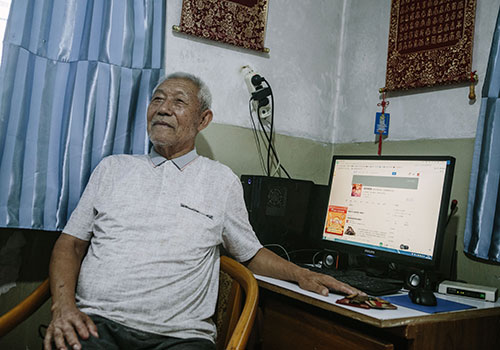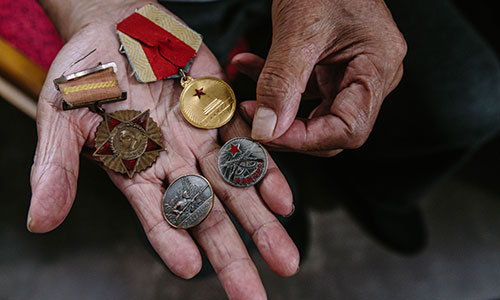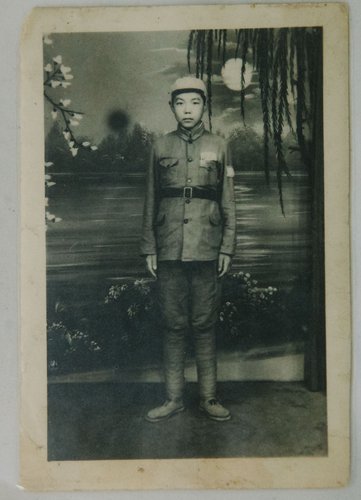Yeah a lot of those western oriented Chinese academic are reading too much the western press and distorted news. Here is the view of tech savvy real korean war veteran who educated the ignorant young chinese about the meaning of real war
As tensions rise on the peninsula, Korean War veteran recalls the cruelty of battle
By Xie Wenting Source:Global Times Published: 2017/9/28 23:29:27
Yin Jixian answers young people's questions related to war and history online. Photo: Li Hao/GT
Although the Chinese public generally take a harsher attitude toward for its sporadic nuclear tests, some veterans who fought in the Korean War think differently.
"If the US wages a war against North Korea, we should send the army to help the country resist US aggression like we did before," said Yin Jixian, who fought in the Korean War (1950-53), or the War to Resist US Aggression and Aid Korea.
Yin, 85, was on the Korean battlefield for six years, fighting against the US army as an artillerist. These days, as the tension between the US and North Korea intensifies, he said he is "particularly sensitive to this situation."
Unlike most elderly people of his age, Yin has good computer skills, which enables him to search for the latest information online. He also has more than 120,000 followers on Zhihu, China's equivalent of Quora, where he tells young people about "correct military history."
He told the Global Times that the reason he thinks China should help North Korea if the US invades isn't just because of the need to "safeguard national sovereignty and interests, which was the major drive for China's involvement in the 1950s."
"Now, the reason for us to help North Korea is for world peace," he told the Global Times. "The US is actually the chief culprit. Because the US wants to sell weapons around the globe, it always likes to set off conflicts and war. It has pushed North Korea too hard. If the US were to start a war again and we could beat them, we would be bringing peace to the people of the world."
However, under the current situation, Yin suggests that dialogue is still the best way to solve the existing problems. "If it's possible, the parties concerned should change the Korean Armistice Agreement to a peaceful agreement for everlasting peace."
Yin's war medals Photo: Li Hao/GT
Cruel battle
Yin was born into a farmer's family in Shandong Province. He said the main memories of his childhood are of repression from landlords and imperialism. He joined the army when he was 15, telling them he was 18 so he would be able to sign up. He participated in the war to cross the Yangtze River and Huaihai Campaign (1948-49) before being sent to North Korea in 1950.
"We were then preparing to recover Taiwan. But suddenly we were told that we were going to North Korea," he said.
Yin's unit first arrived in North Korea by train. When the train passed Yalu River, he still remembered vividly that "in Sinuiju, the lights were brightly lit at night and there were many tall buildings, which was in contrast to the darkness on the Chinese side." Shortly after they arrived in North Korea, he heard intense gunfire and bombings and had to temporarily retreat to China.
Later, they found out that the US had launched an air strike.
"The city was razed to the ground in one day. If this had happened on Chinese land, how many people would have died?" he said. At that moment, he gained a deeper understanding of his mission.
The battle was a cruel one. Compared with the well-equipped US troops, most of the Chinese volunteer army only had weapons they had taken from enemies in previous wars, according to Yin.
"The Soviet Union also provided some equipment. But as many soldiers' literary abilities were low, we didn't know how to use them," he said.
Yin revealed that they mostly fought at night in North Korea. During the day, air strikes from the US were too strong, but at night, it was difficult for the US army to identify targets.
The Chinese army adopted "close quarter fighting" tactics. "I didn't feel afraid. There was no time to be afraid. You had to be very focused," he said.
In the numerous battles he fought, Yin had never worn clothes that didn't have bullet holes in them. He was once shot in the leg, but managed to recover without any long-term effects.
To this day, he said he can't smell perfume, as it makes him think of the dead. In North Korea, Yin and his comrades had to use perfume to cover the foul smell of the corpses they retrieved.
"The war was too cruel. I understood why the North Koreans hated the US so much," he said.
An old photo of Yin in army uniform Photo: Li Hao/GT
Educating the young
After returning to China, Yin was drawn into the Great Leap Forward (1958-60) movement. As he had been opposed to the Great Leap Forward, he was labelled a "rightist" and sent to the Beijing post office to do the most menial jobs.
He and his wife had five children during those harsh years. After retiring, Yin still had to work as a welder to ease his family's financial burden.
His situation improved after the government began to pay more attention to retired soldiers like him in recent years. Now, he is entitled to get more than 6,000 yuan ($900) in extra allowance every month.
Satisfied with his current situation, Yin's main mission now is to "educate the youth on the correct conception of history and values online."
After first surfing the Internet in 2009, he wrote articles and answered netizens' questions about war and history on Zhihu.
He told young people about the battles he experienced and pointed out how ridiculous the plots are in many of today's shoddy war serials.
He sticks staunchly to his Communist ideals and takes his sacred duties as a member of the Communist Party of China seriously.
"What I suffered wasn't a big deal. Looking at the big picture, what the Party and the leaders did was for the overall benefit of the Chinese people and China's development," he stressed.
On Internet forums, many young people doubted his motives and his true identity, prompting him to post his military certificates.
He said he liked to debate with them as this could help more people know about the historical truth. "I have more supporters," he said. But he is still angry when some people attack Chairman Mao and the Party.
Yin admits that he still has many concerns. After talking with many young people, he feels that the values he believes in and fought for are fading away in contemporary society, where the youth never experienced the hardship and suppression he did.
"We don't have sufficient history education at school," he said. "Now, my needs are all satisfied. But young people still need me. So I will do my best to tell them more."


